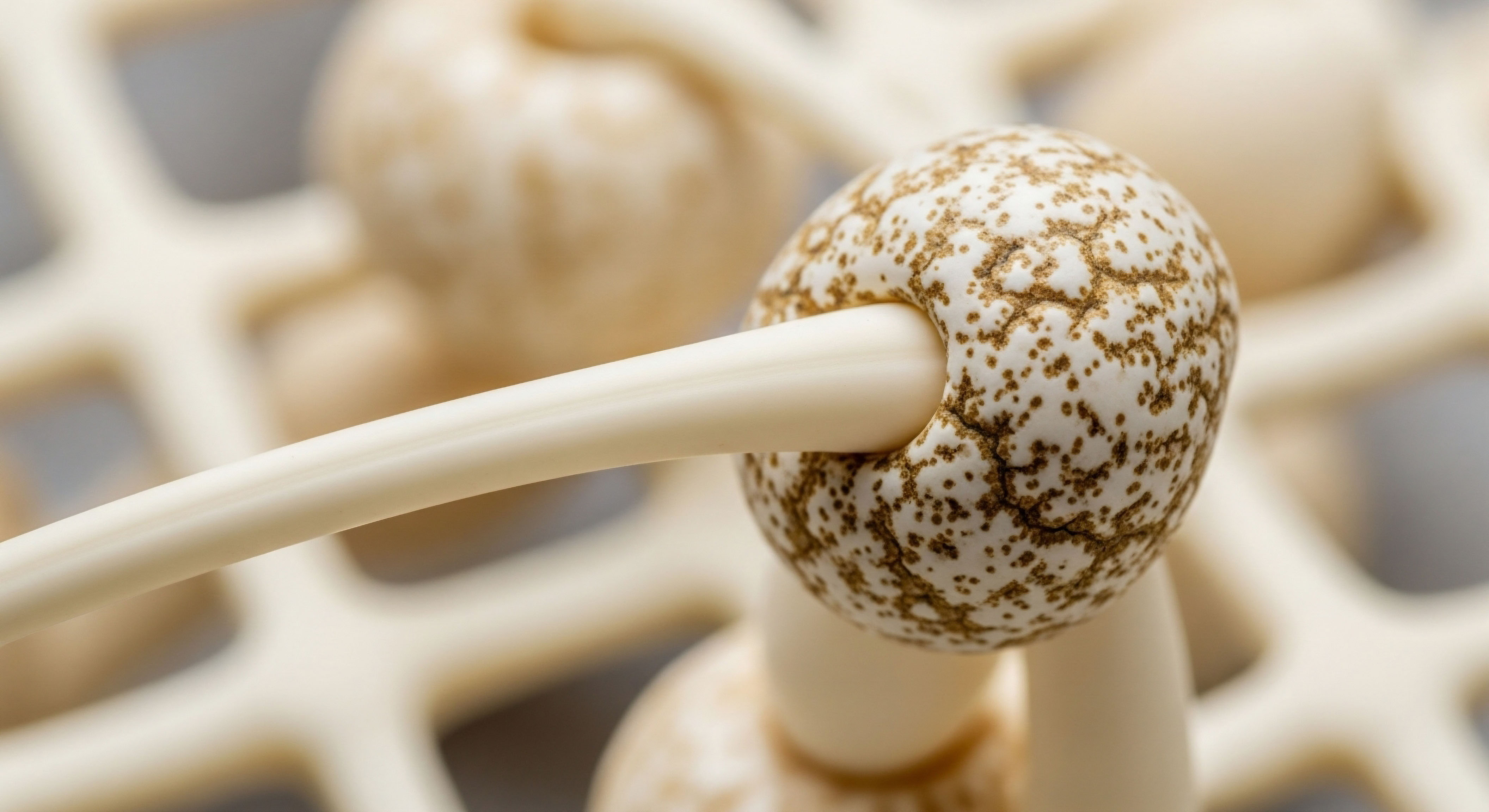

Fundamentals
The feeling is a familiar one for many. It might manifest as a word that sits on the tip of your tongue, a forgotten appointment, or a general sense of mental fog that clouds your day. You may have attributed these moments to stress, lack of sleep, or simply the process of aging.
Your lived experience of this cognitive shift is valid, and it points toward a sophisticated biological reality. The brain does not operate in isolation. Its function is deeply intertwined with the body’s vast internal communication network, the endocrine system. This system uses chemical messengers, or hormones, to orchestrate countless processes, and your cognitive world is one of its most important territories.
Understanding this connection begins with recognizing that key hormones, often associated primarily with reproductive health, are fundamental players in neurocognitive operations. Estrogen, progesterone, and testosterone are not confined to the reproductive organs; they are actively produced, received, and utilized within the brain itself.
Their presence influences everything from the structural integrity of your neurons to the efficiency of the chemical signals that underpin thought, memory, and mood. These molecules are integral components of the biological hardware and software that generate your conscious experience.

The Brain’s Architectural Support System
Think of your brain as a complex and dynamic city. Hormones act as the city’s architects, engineers, and maintenance crews. Estrogen, for example, is a master architect. It promotes the growth of new connections between neurons, a process called dendritic sprouting, which is essential for learning and forming new memories.
It also functions as a potent antioxidant, protecting brain cells from the oxidative stress and damage that accumulate over time. When estrogen levels decline, as they do during perimenopause and post-menopause, the brain’s capacity for structural repair and adaptation can be diminished.
Testosterone also plays a crucial structural and functional role. In both men and women, it helps maintain the volume of grey matter in key brain regions. Functionally, it has a profound relationship with neurotransmitters, particularly dopamine. Dopamine is central to the brain’s reward system, but it also governs motivation, focus, and executive function ∞ the ability to plan, organize, and execute tasks. A decline in testosterone can therefore translate into a noticeable drop in mental drive and sharpness.
The brain’s cognitive performance is directly linked to the health of its hormonal signaling environment.
Progesterone, often working in concert with estrogen, has a distinct role as a modulating and calming agent. Its metabolite, allopregnanolone, enhances the activity of GABA, the brain’s primary inhibitory neurotransmitter. This action helps to temper anxiety and promote a sense of calm, which is a prerequisite for clear thinking and restful sleep. When progesterone levels fluctuate or decline, this calming influence can wane, leading to feelings of irritability or anxiety that disrupt cognitive processes.

Hormonal Fluctuation and Cognitive Experience
The subjective experience of “brain fog” or memory lapses during periods of hormonal change is a direct reflection of these underlying biological shifts. The gradual decline of testosterone in men, a process often termed andropause, can manifest as a loss of competitive edge, reduced mental stamina, and difficulty with concentration.
For women, the more turbulent fluctuations of perimenopause and the eventual steep drop in estrogen and progesterone during menopause often correlate with significant challenges in verbal memory, attention, and processing speed.
These are not imagined symptoms. They are the perceptible results of a changing neurochemical environment. The communication pathways in the brain become less efficient, cellular maintenance schedules are disrupted, and the overall energy metabolism of the brain can be altered. Recognizing that these cognitive changes have a physiological basis is the first step toward understanding how targeted interventions can work to restore the brain’s optimal operating conditions.


Intermediate
Moving beyond the foundational understanding of hormones as neuroprotective agents, we can examine the specific mechanisms through which hormonal interventions actively recalibrate cognitive function. These protocols are designed to replenish the specific signaling molecules the brain relies upon for its complex operations.
The goal is a restoration of the biochemical environment that supports synaptic plasticity, efficient neurotransmission, and overall neuronal health. This process involves a targeted approach, recognizing that male and female brains have different hormonal requirements and respond to different therapeutic strategies.

Recalibrating Male Neurocognition with TRT
For men experiencing the cognitive symptoms of low testosterone, such as diminished focus, motivation, and mental energy, Testosterone Replacement Therapy (TRT) can be a powerful tool for neurological restoration. The standard protocol often involves weekly intramuscular injections of Testosterone Cypionate. This intervention directly addresses the hormonal deficit, but its effects on the brain are multifaceted.
Restoring testosterone levels has a direct impact on the dopaminergic system. By increasing dopamine availability and receptor sensitivity, TRT can enhance executive functions like planning, problem-solving, and sustained attention. This is often experienced subjectively as a return of mental “drive” and clarity. However, a successful protocol is more complex than simply adding testosterone.
The body naturally converts a portion of testosterone into estrogen via the aromatase enzyme. While some estrogen is necessary for male brain health, excessive levels can lead to moodiness and cognitive clouding. This is why protocols frequently include an Anastrozole tablet, an aromatase inhibitor that carefully manages this conversion, ensuring a balanced neurochemical environment.
Furthermore, to maintain the brain’s natural signaling pathways, protocols often incorporate Gonadorelin. This peptide stimulates the pituitary gland, encouraging the body’s own production of luteinizing hormone (LH) and follicle-stimulating hormone (FSH). This helps preserve the integrity of the entire Hypothalamic-Pituitary-Gonadal (HPG) axis, the master regulatory system for hormonal balance, preventing a complete reliance on external hormones.

Supporting Female Cognitive Health through Menopause
For women navigating the cognitive challenges of perimenopause and post-menopause, hormonal interventions are aimed at stabilizing a system in flux. The protocols are nuanced, often involving a combination of hormones to address the wide-ranging effects of estrogen and progesterone decline.
Low-dose Testosterone Cypionate, administered via subcutaneous injection, is increasingly recognized for its role in female cognitive and mood health. Studies have shown that testosterone therapy in women can lead to significant improvements in mood, energy, and concentration, which are often more pronounced than the direct cognitive enhancements. This improvement in overall well-being creates a more stable foundation for cognitive function.
The cornerstone for many women, however, remains the replacement of estrogen and progesterone.
- Estrogen ∞ Delivered via patches or gels, estrogen replacement directly supports the health of the hippocampus and prefrontal cortex, brain regions critical for memory and executive function. It has been shown to protect verbal memory in particular.
- Progesterone ∞ Oral or topical progesterone is crucial for women with an intact uterus to protect the endometrium, but its neurological benefits are also significant. Its conversion to allopregnanolone enhances GABAergic activity, which can improve sleep quality and reduce anxiety. Better sleep is directly correlated with improved memory consolidation and cognitive performance the following day.
Effective hormonal therapy is a process of biochemical recalibration, not just replacement.
The following table outlines the distinct primary neurocognitive targets of key hormonal interventions:
| Hormone/Agent | Primary Neurocognitive Target | Common Subjective Experience |
|---|---|---|
| Testosterone (Men & Women) | Dopamine system modulation, motivation, and executive function. | Increased mental drive, focus, and energy. |
| Estrogen (Women) | Hippocampal and prefrontal cortex support, synaptic plasticity, verbal memory. | Improved word recall, reduced “brain fog.” |
| Progesterone (Women) | GABA system enhancement, sleep quality, and anxiety reduction. | Calmer mood, more restorative sleep. |
| Anastrozole (Men) | Regulation of testosterone-to-estrogen conversion. | Stabilized mood, reduced cognitive clouding. |

The Role of Growth Hormone Peptides in Cognitive Support
Beyond direct sex hormone replacement, peptide therapies offer another avenue for influencing neurocognitive function, primarily through indirect mechanisms. Peptides like Sermorelin and the combination of Ipamorelin / CJC-1295 are growth hormone secretagogues. They stimulate the pituitary gland to release human growth hormone (HGH), particularly during sleep.
The primary cognitive benefit of this therapy stems from its profound impact on sleep architecture. By promoting deeper, more restorative sleep cycles, these peptides allow the brain to more effectively perform its nightly maintenance tasks ∞ clearing metabolic waste, consolidating memories, and repairing cellular damage.
Patients often report waking with enhanced mental clarity and improved focus throughout the day, a direct result of optimized sleep quality. While not a direct cognitive enhancer in the way that testosterone or estrogen are, the role of these peptides in supporting the foundational pillar of sleep makes them a valuable component of a comprehensive wellness protocol.


Academic
A sophisticated analysis of how hormonal interventions affect neurocognition requires moving beyond a simple model of hormone replacement. The most insightful perspective is one rooted in systems biology, examining the intricate interplay between the endocrine system, the immune system, and cellular energy metabolism within the central nervous system.
The decline of sex hormones with age does not merely remove a set of neuroprotective molecules; it fundamentally alters the brain’s homeostatic balance, often tipping it toward a state of chronic, low-grade neuroinflammation and mitochondrial dysfunction. Hormonal interventions, therefore, can be understood as a strategy to restore a less inflammatory and more energetically efficient neurological environment.

The HPG Axis and Neuroinflammatory Control
The Hypothalamic-Pituitary-Gonadal (HPG) axis is the master regulator of sex hormone production. Its age-related decline is a primary driver of menopause and andropause. Critically, the hormones produced by this axis ∞ estrogen and testosterone ∞ are powerful modulators of the brain’s resident immune cells, the microglia. In a youthful, hormonally replete brain, microglia exist primarily in a resting, surveillance state. They perform essential housekeeping functions without generating a significant inflammatory response.
Estrogen, in particular, exerts tight control over microglial activation. It suppresses the production of pro-inflammatory cytokines like tumor necrosis factor-alpha (TNF-α) and interleukin-6 (IL-6). When estrogen levels fall, this braking mechanism is released. Microglia can become chronically activated, shifting to a pro-inflammatory phenotype.
This state is characterized by the release of inflammatory molecules that can damage neurons, impair synaptic function, and contribute directly to the cognitive decline observed in postmenopausal women. Research has linked this heightened inflammatory state to an increased risk for neurodegenerative conditions.
Testosterone and its metabolite dihydrotestosterone (DHT) also possess anti-inflammatory properties in the brain. They can ameliorate neuroinflammation and have shown neuroprotective effects in preclinical models. Consequently, the decline in androgens associated with aging in men can contribute to a similar, albeit perhaps less abrupt, increase in the brain’s inflammatory tone, impacting neuronal health and cognitive processes.
Hormonal interventions can be viewed as a form of neuro-immunomodulation, restoring the brain’s ability to control inflammation.

Mitochondrial Bioenergetics and Hormonal Regulation
The brain is an organ with immense energy demands, consuming roughly 20% of the body’s oxygen and glucose despite making up only 2% of its weight. This energy is produced by mitochondria, the cell’s powerhouses. The efficiency of mitochondrial function is paramount for all neuronal activity, from firing action potentials to synthesizing neurotransmitters and maintaining cellular structures.
Estrogen is a key regulator of mitochondrial bioenergetics. It enhances the efficiency of the electron transport chain, the primary mechanism of ATP production. It also upregulates antioxidant enzymes within the mitochondria, protecting them from the damaging reactive oxygen species (ROS) that are a natural byproduct of energy production.
The loss of estrogen during menopause can lead to a decline in mitochondrial efficiency and an increase in oxidative stress within neurons. This bioenergetic deficit can manifest as “brain fog” and reduced cognitive stamina, as neurons struggle to meet their energy demands.
What are the long-term implications of this bioenergetic decline? A state of chronic energy deficit and elevated oxidative stress can accelerate the processes of cellular aging and increase vulnerability to neurodegenerative pathologies. By restoring hormonal levels, interventions may help preserve mitochondrial function, ensuring that neurons have the energy required for optimal performance and long-term survival.
The following table details the influence of key hormones on specific cellular and molecular mechanisms within the brain.
| Hormone | Cellular Target | Molecular Mechanism of Action | Resulting Neurocognitive Effect |
|---|---|---|---|
| Estradiol (E2) | Microglia, Neurons | Suppresses NF-κB signaling pathway, reducing pro-inflammatory cytokine release. Upregulates brain-derived neurotrophic factor (BDNF). | Reduced neuroinflammation; enhanced synaptic plasticity and memory formation. |
| Testosterone | Neurons | Modulates the expression and sensitivity of dopamine D1 and D2 receptors. | Improved executive function, motivation, and mental focus. |
| Progesterone | GABA-A Receptors | Metabolizes to allopregnanolone, a potent positive allosteric modulator of the GABA-A receptor. | Increased inhibitory tone, reduced neuronal excitability, improved sleep. |
| Growth Hormone (via Peptides) | Systemic/Indirect | Promotes deeper sleep stages (NREM Stage 3-4), allowing for enhanced glymphatic clearance of metabolic waste. | Improved mental clarity upon waking, better memory consolidation. |
Therefore, the decision to initiate hormonal therapy extends beyond mere symptom management. It represents a clinical strategy aimed at intervening in the fundamental processes of neuroinflammation and bioenergetic decline that accompany aging. The goal is to shift the brain’s internal environment away from a state of chronic stress and degradation and back toward one of resilience, repair, and efficient function.
This systems-level approach provides a robust scientific rationale for the observed improvements in cognitive function over time with well-managed hormonal interventions.

References
- Brinton, Roberta D. “Progesterone-induced neuroprotection ∞ efficacy and mechanisms of action.” Endocrine, vol. 32, no. 1, 2007, pp. 33-42.
- Rosario, E. R. et al. “Age-related testosterone depletion and the development of Alzheimer’s disease.” BMC Neuroscience, vol. 11, no. 1, 2010, p. 105.
- Sherwin, Barbara B. “Estrogen and cognitive functioning in women.” Endocrine Reviews, vol. 24, no. 2, 2003, pp. 133-51.
- Celec, Peter, et al. “The effects of testosterone on cognitive function in men ∞ a review.” Neuroendocrinology Letters, vol. 36, no. 5, 2015, pp. 423-31.
- Villa, A. et al. “Sex hormones and neuroinflammation in Alzheimer’s disease.” Frontiers in Neuroendocrinology, vol. 43, 2016, pp. 60-71.
- Hogervorst, E. et al. “Hormone replacement therapy for cognitive function in postmenopausal women.” Cochrane Database of Systematic Reviews, no. 4, 2009.
- Gracia, Clarisa R. and Ellen W. Freeman. “Ovarian aging and the menopausal transition.” Seminars in Reproductive Medicine, vol. 36, no. 05, 2018, pp. 259-68.
- Henderson, Victor W. “Cognitive changes after menopause ∞ influence of estrogen.” Clinical Obstetrics and Gynecology, vol. 51, no. 3, 2008, pp. 618-26.
- Janicki, Joseph S. et al. “Testosterone and cognition in aging men ∞ a systematic review.” Journal of the American Geriatrics Society, vol. 63, no. 1, 2015, pp. 137-45.
- Veldhuis, Johannes D. “Aging and the male endocrine system.” The Aging Male, vol. 2, no. sup1, 1999, pp. 15-25.

Reflection
The information presented here provides a map of the intricate biological landscape connecting your hormonal systems to your cognitive world. It translates the subjective feelings of mental shifts into a language of cellular communication, inflammatory balance, and energy metabolism. This knowledge serves a distinct purpose ∞ to move the conversation about your health from one of passive observation to one of active, informed participation.
Consider the data points of your own life. The moments of clarity, the periods of fog, the fluctuations in energy and mood ∞ these are all signals from your internal environment. Now, you have a framework for understanding what those signals might mean. This framework is not an endpoint. It is a starting point for a more profound inquiry into your own unique physiology.
The path toward optimizing your cognitive function and overall vitality is inherently personal. It involves integrating the objective data from laboratory tests with the subjective data of your daily experience. The true potential lies not just in understanding the science, but in applying that science to the context of your own life, in partnership with guidance that recognizes your individual needs. What will you do with this new level of understanding?



